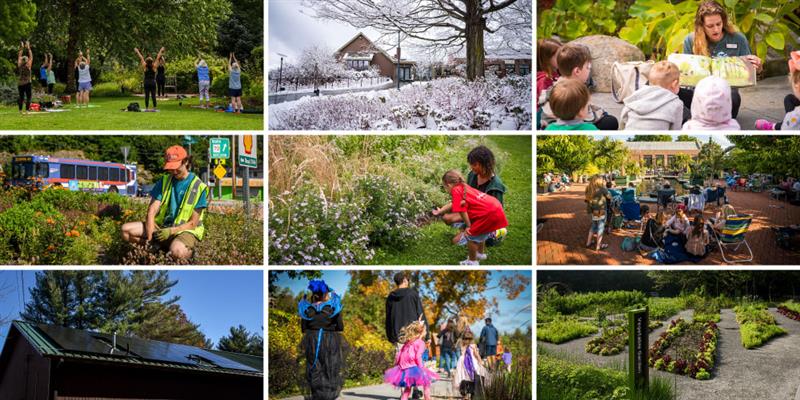By Grace Elton, CEO, New England Botanic Garden at Tower Hill
December 2023

The end of the year always feels like a time for reflection. Here at New England Botanic Garden, 2023 marked another year of tremendous achievement and growth. Looking back on the highlights fills me with gratitude because we could not have made the profound impact that I’m so proud of without the support of our dedicated community. This includes staff, Garden members, volunteers, donors, visitors, and fans. Our commitment to connecting people with plants has never been stronger, and we make it happen in so many different ways.
Welcoming Visitors:
- In 2023, we welcomed more than 200,000 visitors to the Garden to experience the wonder of plants, learn about the natural world, and make joyful connections.
Educational Offerings:
- Our robust lineup of educational classes, workshops, exhibits, events, and programs created meaningful, accessible, and hands-on learning experiences for people of all ages catering to the diverse needs and interests of our community — 4,928 adult education participants and 10,414 youth and family education participants took part in these offerings.
Outreach:
- Collaborating with residents and community-based organizations in Worcester, the Garden advocated for and supported healthy and climate-resilient communities. Our staff enhanced urban green spaces by transforming traffic islands and rotaries, planting 235 trees, and installing 33 large-scale planters on city streets lacking tree canopy.
- Additionally, with the support of funders, we brought nature-based educational programs to youth from under-resourced communities in greater Worcester, covering topics like habitats, tree science, climate change, environmental justice, green industry careers, and more.
Expanded Access:
- New England Botanic Garden partners with the Card to Culture program to offer discounts throughout the year to individuals with an EBT, WIC, or ConnectorCare card. In 2023, during the months of June, July, and August, we extended free admission to eligible participants through this program.
Community Engagement Events:
- This year, the Garden partnered with different organizations to bring events to the community, including the Arbor Day Festival in Worcester. Onsite, our partnerships led to hosting diverse events such as low-sensory evenings with HMEA’s Autism Resource Central, celebrating LGBTQ+ pride with Pride Worcester, and more.
Conservation and Sustainable Initiatives:
- Accessible, hands-on, and youth-oriented garden, our new Climate Garden opened in the summer of 2023 and demonstrates agriculture techniques for a more sustainable future. As the Garden matures, young visitors will explore crop plants celebrated for their drought tolerance, nitrogen-fixing ability, contribution to pollinator habitat, and more.
- In the fall of 2023, the Garden installed a solar array onto the roof of the horticulture barn. The array now powers the Garden’s fleet of electric land care equipment and utility carts. This major project aligns with the Garden’s commitment to environmental stewardship and sustainability by decarbonizing horticulture operations and promoting sustainable practices.
- Planted during the spring and summer of 2023, the Beneficial Border was originally an out-of-control area filled with invasive species. This three-tiered border between the Lawn Garden and Apple Orchard has been transformed into a pollinator’s paradise featuring a diverse array of plants including native plants like little bluestem (Schizachyrium scoparium), wild lupine (Lupinus perennis), and doll’s eyes (Actaea pachypoda).
- In the fall, the Garden got involved in an exciting American chestnut restoration effort, planting 20 blight-resistant, 100 percent American chestnut (Castanea dentata) seedlings that came from a breeding program through the Virginia based non-profit, the American Chestnut Cooperators’ Foundation (ACCF). ACCF aims to restore a blight-resistant, 100 percent American chestnut tree to eastern forests, and their trees trace their parentage to a population of American chestnuts that survived the blight introduced in the early 20th century. As part of the Garden’s partnership with ACCF, we will monitor the trees and report their progress yearly.
Supporting Healthy Communities:
- Harvesting vegetables from our garden, we donated over 500 pounds to the food pantry offered by the South Worcester Neighborhood Center, contributing to community well-being.
As one of 700 public gardens in the country, New England Botanic Garden acts as a catalyst contributing to the conservation of biodiversity through our plant collections, promoting mental well-being through our green spaces, engaging individuals and communities through educational offerings and outreach, increasing access through community events and programs, raising awareness about climate change and inspiring sustainability through our initiatives, and more.
I look forward to the New Year ahead and to the Garden growing even more in its role as a horticultural resource, a regional destination, and a place of joy where everyone belongs.

